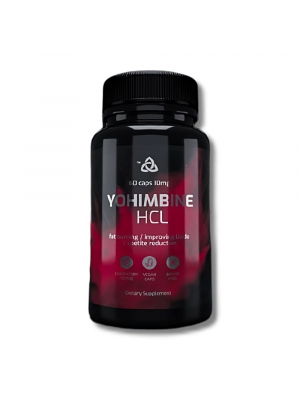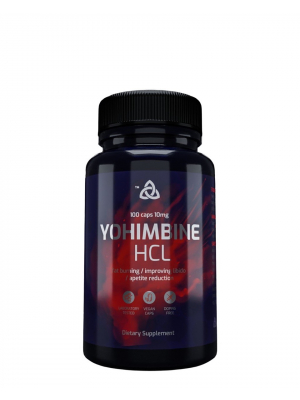ZNIZKA 5% NA PIERWSZE ZAMOWIENIE Z KODEM FRST5
Yohimbine: Benefits, Uses, and Risks Explained

The Comprehensive Guide to Yohimbine: Benefits, Uses, and Risks
In the realm of health and fitness supplements, certain substances have gained considerable attention for their potential to support fat loss, improve athletic performance, and even enhance sexual health. One such supplement is Yohimbine, a compound extracted from the bark of the Pausinystalia yohimbe tree, native to Central and Western Africa. Traditionally used in African medicine as an aphrodisiac and to treat ailments like fever and cough, Yohimbine has made its way into modern health circles due to its intriguing benefits.
This blog aims to dive deep into Yohimbine, exploring its benefits, mechanisms, common uses, risks, and overall effectiveness based on current scientific literature.
What is Yohimbine?
Yohimbine is an alkaloid derived from the bark of the yohimbe tree. It's most commonly known for its role as an alpha-2 adrenergic receptor antagonist, which means it blocks these receptors. In doing so, Yohimbine increases adrenaline release and inhibits fat storage by enhancing fat mobilization in the body, particularly during periods of fasting or exercise. Its action on alpha-2 receptors is also why it's often touted as a remedy for erectile dysfunction (ED) and sexual performance issues.
As a natural supplement, Yohimbine is sold in various forms, including standalone extracts, capsules, or as an ingredient in fat burners or pre-workout supplements. It's also available by prescription in some regions for specific medical conditions such as ED.
How Does Yohimbine Work?
To fully understand how Yohimbine works, it’s essential to grasp its effect on alpha-2 adrenergic receptors. These receptors are located in adipose tissue (fat cells) and are involved in the regulation of fat breakdown. When Yohimbine blocks these receptors, it allows for increased norepinephrine (a hormone and neurotransmitter) activity. Norepinephrine stimulates lipolysis, the process by which fat is broken down and released from fat cells into the bloodstream, where it can be used as energy.
This mechanism is particularly useful during fasting or exercise, periods when the body is already primed to use fat as a fuel source. This makes Yohimbine a popular supplement among athletes and bodybuilders aiming to accelerate fat loss during cutting phases.
However, Yohimbine’s effects are not limited to fat loss. Its action on the nervous system also impacts mood, blood flow, and sexual function, which explains its historical use in treating erectile dysfunction and improving libido.
Key Benefits of Yohimbine
- Enhanced Fat Loss
The most well-known benefit of Yohimbine is its potential to aid in fat loss. By blocking alpha-2 receptors, Yohimbine can increase the release of stored fat for energy, especially in areas where fat loss is typically more challenging, such as the lower abdomen and thighs. Research suggests that it is particularly effective when combined with exercise and fasting, as these states increase norepinephrine and fat oxidation.
One study published in Research in Sports Medicine found that elite soccer players who took Yohimbine lost more body fat compared to those who didn’t, without affecting muscle mass or performance. While the results were modest, they were significant enough to suggest that Yohimbine can play a role in fat loss, especially for athletes or fitness enthusiasts.
- Improved Exercise Performance
Another area where Yohimbine may offer benefits is in exercise performance, particularly by enhancing energy levels and focus. Because it increases norepinephrine, Yohimbine has a stimulatory effect similar to caffeine, which may boost mental alertness, motivation, and physical endurance. Athletes looking for an edge in high-intensity workouts or competitions often use Yohimbine as part of their pre-workout routine for this reason.
However, it is important to note that Yohimbine’s stimulating effects can also lead to increased heart rate and anxiety in some individuals, so its use should be monitored carefully, especially during intense training sessions.
- Sexual Health and Erectile Dysfunction
Yohimbine’s reputation as a natural aphrodisiac stems from its effects on blood flow and its ability to increase nitric oxide production. Nitric oxide is a key factor in achieving and maintaining an erection, as it helps dilate blood vessels, improving circulation to the genital area.
Several studies support the use of Yohimbine for erectile dysfunction. For instance, a study published in the Journal of Urology found that men with ED who took Yohimbine experienced significant improvements in erectile function compared to a placebo group. Its efficacy is likely due to both its vasodilatory effects and its ability to increase arousal through enhanced norepinephrine activity.
Additionally, some research suggests that Yohimbine may improve libido in both men and women, making it a potential option for those experiencing low sexual desire.
- Increased Energy and Focus
Due to its action on norepinephrine and adrenaline, Yohimbine is often used as a nootropic or mental enhancer. Many users report improved focus, cognitive function, and even a heightened sense of motivation when taking the supplement. This is particularly beneficial for athletes or individuals who need an extra boost of energy and mental clarity, whether for workouts, competitions, or mentally demanding tasks.
However, the stimulation of the nervous system comes with a caveat: Yohimbine can sometimes cause jitteriness, irritability, or even panic attacks in individuals sensitive to stimulants, especially when taken in higher doses.
Potential Side Effects and Risks of Yohimbine
While Yohimbine offers several potential benefits, it also comes with a notable set of risks. These include:
- Increased Heart Rate and Blood Pressure
Yohimbine’s ability to stimulate the release of norepinephrine and adrenaline can lead to increased heart rate and elevated blood pressure. This makes it a risky supplement for individuals with pre-existing cardiovascular conditions, hypertension, or anxiety disorders. For this reason, anyone considering Yohimbine should consult with a healthcare provider before use, especially if they have a history of heart-related health issues.
- Anxiety and Nervousness
The same stimulatory effects that can enhance focus and energy in some people may cause anxiety, nervousness, or panic in others. High doses of Yohimbine, particularly when combined with other stimulants like caffeine, may exacerbate these feelings, leading to jitteriness, restlessness, or even acute panic attacks. It’s recommended to start with a low dose and gradually increase to assess your individual tolerance.
- Digestive Issues
Some users report gastrointestinal distress, including nausea, vomiting, or upset stomach, particularly when Yohimbine is taken on an empty stomach. To avoid these issues, many experts recommend consuming Yohimbine with food, although this may reduce its fat-burning efficacy slightly.
- Insomnia
Since Yohimbine increases adrenaline and norepinephrine, it can interfere with sleep patterns if taken later in the day. Many users report difficulty falling asleep or staying asleep after using Yohimbine, particularly if consumed in the afternoon or evening. To mitigate this risk, it’s advisable to take Yohimbine earlier in the day, ideally before a workout or during a fasting period.
- Interaction with Medications
Yohimbine may interact with several medications, including antidepressants, blood pressure medications, and stimulants. For this reason, it’s crucial to discuss Yohimbine supplementation with your healthcare provider if you are currently taking any prescription drugs or have underlying health conditions.
Dosage and Supplementation Guidelines
When it comes to dosing Yohimbine, less is often more. The typical recommended dosage ranges between 5-20 mg per day, depending on the individual’s tolerance and goals. Starting at the lower end of this spectrum is crucial, especially if you are new to the supplement or sensitive to stimulants.
Tips for Yohimbine Use:
- Start Low and Go Slow: Begin with a low dose of 2.5-5 mg to assess your tolerance and avoid side effects. Gradually increase the dosage if needed.
- Timing: Take Yohimbine before exercise or in the morning during a fasting period for optimal fat-burning effects. Avoid taking it in the afternoon or evening to prevent insomnia.
- Fasting: Yohimbine is most effective when taken on an empty stomach, as insulin blunts its fat-burning effects. Many people use it as part of an intermittent fasting regimen.
- Avoid with Other Stimulants: Combining Yohimbine with caffeine or other stimulants can increase the risk of anxiety, jitteriness, and cardiovascular issues. If you do combine them, start with very low doses.
Who Should Avoid Yohimbine?
While Yohimbine can offer benefits for certain individuals, it is not suitable for everyone. Those who should avoid or be cautious when using Yohimbine include:
- Individuals with Heart Conditions: Yohimbine can raise blood pressure and heart rate, making it dangerous for those with cardiovascular issues.
- People with Anxiety or Panic Disorders: Yohimbine’s stimulatory effects can exacerbate anxiety, panic attacks, and nervousness.
- Individuals with High Blood Pressure: Since Yohimbine increases norepinephrine, it can elevate blood pressure, posing risks for people with hypertension.
- Pregnant or Breastfeeding Women: There is limited research on the safety of Yohimbine during pregnancy or breastfeeding, so it’s best avoided during these periods.
- Individuals Taking Medications: Those on medications for depression, anxiety, or blood pressure should consult with their healthcare provider before taking Yohimbine to avoid potential interactions.
Final Thoughts: Is Yohimbine Right for You?
Yohimbine is a potent and intriguing supplement with a variety of applications. From its potential to enhance fat loss and boost exercise performance to its use in improving sexual function, it offers multiple benefits for those looking to optimize their health and fitness. However, its stimulatory effects can also pose risks, particularly for individuals with cardiovascular issues, anxiety, or sensitivity to stimulants.

 English
English



























Komentarze